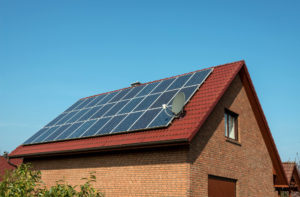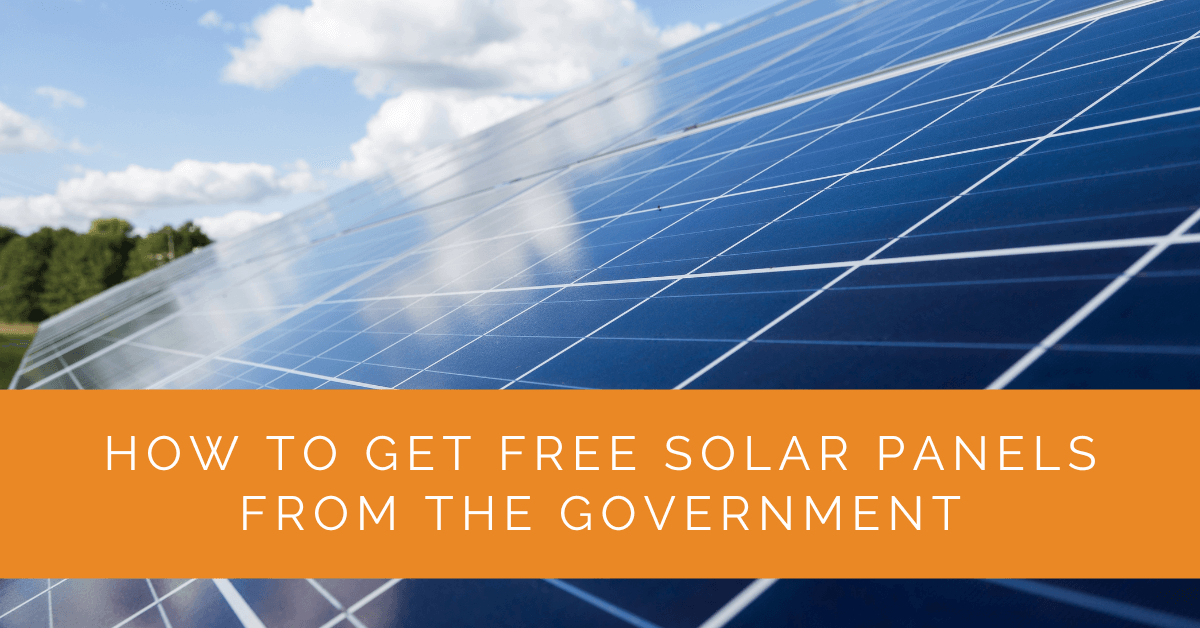As the demand for solar energy rises, governments offer various incentive programs to promote solar panel adoption. This article will delve into these programs, exploring how homeowners can obtain free or heavily subsidized solar panels through government initiatives. Discover how you can benefit from these programs and unlock opportunities for a sustainable and cost-effective solar energy solution.
Contents
Key Takeaways
- Solar incentive programs offered by the government provide opportunities for homeowners to obtain free or heavily subsidized solar panels, reducing the upfront cost of going solar.
- Researching federal, state, and local solar incentives can unveil financial benefits such as tax credits, rebates, and grants, making solar energy more accessible and affordable.
- Government-funded programs specifically target low-income households and communities, providing free solar panels to promote renewable energy adoption and reduce utility bills.
Understanding Solar Incentive Programs
Solar incentive programs play a significant role in making solar panel installation more accessible and affordable for homeowners. These programs are designed to incentivize the adoption of solar energy by offering financial benefits. Homeowners can make informed decisions about their solar panel investments by understanding the various solar incentives available.
Federal Solar Incentives
The federal government provides several financial incentives to support residential solar projects. One of the most prominent incentives is the federal solar investment tax credit (ITC). The ITC allows homeowners to claim a percentage of the total system cost as a tax credit, substantially reducing upfront expenses. The current ITC percentage offers a 30% tax credit for systems installed between 2022 and 2032. This is an increase from the previously planned tax credit rates. Starting from 2033, the tax credit will decrease, decreasing to 26% in 2033 and further reducing to 22% in 2034. No maximum limit on the amount can be claimed under this credit. This tax credit can be applied to the homeowner’s federal income taxes, enabling significant savings.
In addition to the ITC, federal grants, and loan programs are available to further assist homeowners in financing their solar projects. These programs provide financial support and favorable terms, making it easier for homeowners to access funds for solar panel installation. By taking advantage of these federal incentives, homeowners can lower the overall cost of their solar energy systems.
State and Local Solar Incentives
State and local governments also offer a variety of solar incentive programs to encourage homeowners to adopt renewable energy. These programs differ by location, reflecting each state or locality’s unique priorities and resources. State-level incentives often include rebates, tax credits, performance-based incentives, and grants.
Rebates provide homeowners with direct financial incentives after the installation of solar panels. The rebate amount is typically based on the system’s size and energy output. Tax credits, like the federal ITC, allow homeowners to deduct a portion of the solar system’s cost from their state income taxes. Performance-based incentives reward homeowners based on the energy their solar panels produce over a set period.
Furthermore, grants can be an excellent source of financial assistance for homeowners. These grants are typically awarded based on various criteria, such as income level, energy goals, or environmental considerations. By researching state and local solar incentives, homeowners can identify programs that align with their needs and significantly reduce the upfront cost of going solar.

Exploring Free Solar Panel Programs
Several programs allow homeowners to obtain solar panels with little or no upfront cost. These programs are designed to make solar energy more accessible to a wider range of households, including those with limited financial resources. By exploring these free solar panel programs, homeowners can enjoy the benefits of solar energy without the burden of high upfront expenses.
Solar Lease and Power Purchase Agreements (PPAs)
Solar lease and power purchase agreements (PPAs) are popular options for homeowners who want to go solar without the financial commitment of purchasing a solar panel system outright. In a solar lease arrangement, homeowners agree with a solar company leasing the system for a fixed period. The homeowner pays a monthly lease fee and benefits from reduced electricity bills. The solar company typically owns and maintains the system during the lease period.
Similarly, with a PPA, homeowners purchase the solar energy generated by a system installed on their property at a predetermined rate. The solar company installs and maintains the system, and homeowners pay for the energy produced by the panels. Both solar lease and PPA options allow homeowners to enjoy the benefits of solar power without the upfront cost and responsibility of owning and maintaining the system.
Government-funded Solar Programs
Government-funded programs are crucial in providing eligible homeowners with free or heavily subsidized solar panels. These programs aim to promote renewable energy adoption, reduce carbon emissions, and make clean energy accessible. While specific programs vary by location, they often target low-income households or specific communities to ensure equitable access to solar energy.
By partnering with local organizations, non-profits, or government agencies, these government-funded programs offer qualified homeowners the opportunity to receive free or heavily subsidized solar panels. These initiatives address economic barriers and contribute to environmental sustainability by encouraging the transition to clean energy.
Some government-funded programs focus on low-income households, aiming to alleviate energy burdens and reduce utility bills. These programs prioritize communities that may otherwise struggle to afford solar panel installation. These initiatives empower homeowners to reduce their reliance on conventional energy sources and save money on their monthly utility bills by providing free solar panels. Additionally, these programs often include education and training to ensure homeowners can make the most of their solar panel systems and optimize their energy savings.
Other government-funded programs may target specific communities, such as schools, community centers, or public buildings. These programs recognize the value of solar energy in public infrastructure and its positive impact on the surrounding community. By installing solar panels on these facilities, governments promote renewable energy generation and inspire others to follow suit.
To participate in government-funded solar programs, homeowners must meet specific eligibility requirements. These may include income thresholds, residency criteria, or participation in energy efficiency programs. Homeowners need to research and understand each program’s guidelines and application process to ensure they meet the necessary qualifications.
It is worth noting that the availability and scope of government-funded programs can vary depending on local government policies, budget allocations, and the overall commitment to renewable energy. Therefore, homeowners must stay updated on their local government’s initiatives and any changes in solar incentive programs.

Researching and Applying for Solar Incentive Programs
To take advantage of solar incentive programs and explore opportunities to obtain free or heavily subsidized solar panels, homeowners should follow these essential steps:
Locating State and Local Incentive Programs
Start by researching your area’s state and local solar incentive programs. Visit government websites, local energy offices, or online resources that compile information on these programs. These sources provide valuable insights into the incentives offered, including details about rebates, tax credits, grants, or government-funded initiatives that provide free solar panels.
Assessing Eligibility and Program Requirements
Carefully review the eligibility criteria for each program. This may include income levels, property ownership, residency, or participation in energy efficiency programs. Understanding these requirements will help you identify the programs that align with your specific circumstances and maximize your chances of qualifying for free or heavily subsidized solar panels.
Application Process and Timelines
Once you have identified suitable programs, familiarize yourself with the application process and submission timelines. Each program may have specific documentation requirements, such as proof of income, property ownership, or energy consumption history. It is essential to gather all the necessary documents and submit your application within the designated timeframe to be considered for the program.
If you encounter any challenges or have questions throughout the process, consider contacting solar professionals, local energy offices, or program administrators for guidance and support. These resources can provide valuable insights, address your concerns, and ensure that you navigate the application process effectively.
Remember that solar incentive programs can significantly reduce the upfront cost of your solar panel system, making the transition to renewable energy more accessible and affordable. By researching and applying for these programs, you can benefit from the financial benefits and contribute to a cleaner and more sustainable future.
Experience Solar Excellence with Us!
Trust in Solar Panels Network USA, where our seasoned experts deliver top-quality solar solutions for homes and businesses nationwide. With a legacy of countless successful installations and a commitment to sustainable energy, we’re your reliable partner in the solar journey. Ready for a brighter, eco-friendly future? Call us now at (855) 427-0058 and harness the power of the sun!
Conclusion
Solar incentive programs the government offers give homeowners opportunities to obtain free or heavily subsidized solar panels, making solar energy more accessible and affordable. By understanding federal, state, and local incentives, homeowners can unlock the benefits of solar energy and positively impact their finances and the environment. Exploring options such as the federal solar investment tax credit, state rebate programs, and government-funded initiatives can significantly reduce the upfront cost of installing a solar panel system. Don’t miss out on these opportunities to go solar and save money on your energy bills. Take the initiative to research, assess eligibility, and apply for solar incentive programs. Embrace the clean and renewable power of the sun, and contribute to a sustainable future powered by solar energy. Start your solar journey today!
About the Author
Solar Panels Network USA stands at the forefront of solar energy solutions, driven by a team of seasoned solar engineers and energy consultants. With over decades of experience in delivering high-quality solar installations and maintenance, we are committed to promoting sustainable energy through customer-centric, tailored solutions. Our articles reflect this commitment, crafted collaboratively by experts to provide accurate, up-to-date insights into solar technology, ensuring our readers are well-informed and empowered in their solar energy decisions.

